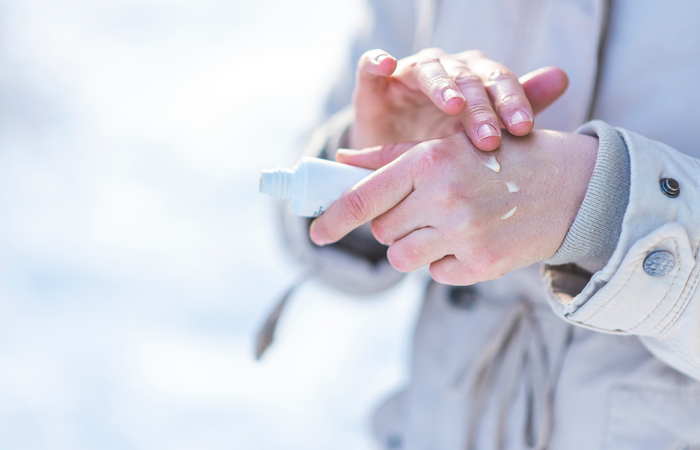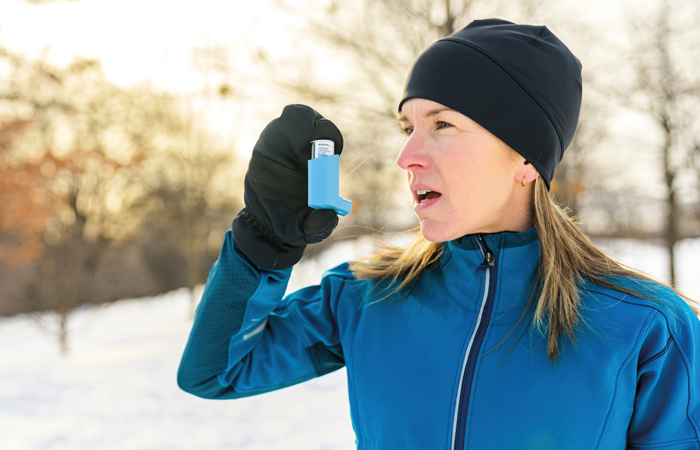In Conditions
Follow this topic
Bookmark
Record learning outcomes
Pharmacy teams will know only too well what a challenging season winter can be: no sooner does the temperature drop than numerous illnesses start to soar. While many minor ailments such as coughs, colds and sore throats can usually be treated at home, the chilly weather can also have more serious consequences, increasing the risk of heart attack, stroke and pneumonia, to name just a few conditions.
In fact, according to the latest winter mortality figures from the Office for National Statistics (ONS) “an estimated 13,400 more deaths occurred in the winter period (December 2021 to March 2022) compared with the average of the non-winter periods” (the preceding August to November and following April to July). And if that seems shockingly high, most years the seasonal difference is even greater – these new figures are the second-lowest since the early 1950s.
With the colder months piling extra pressure on patients and health services alike, there are many ways in which pharmacy teams can help. “Pharmacies usually have a wide range of cold and flu remedies in stock, and staff will be able to help people choose what’s right for them, and make sure that any products don’t interact with prescribed medication,” says Chloe MacArthur, senior cardiac nurse at the British Heart Foundation (BHF). “They can also let people know if seeing their GP would be better in their case.”
Matters of the heart
Cold weather increases the risk of heart and circulation problems. “When you are cold, blood vessels tighten in your skin, fingers and toes, so that less heat gets lost,” explains Chloe. “Tightening also puts pressure on your heart to work harder and can increase our heart rate and blood pressure.” While this response is natural, the extra strain can trigger symptoms in patients with a pre-existing heart condition, “especially during physical activity”.
Heart attacks and strokes were more than twice as likely to happen for people aged over 60 during cold spells lasting at least four days, according to BHF-funded research carried out by scientists at the University of Bristol and University College London.
“Angina patients may notice that their symptoms get worse in winter,” continues Chloe. “In addition to this, our blood can become thicker and stickier, which means that it could be more likely to form clots, which can lead to a heart attack or stroke.”
The BHF has lots of helpful information on its website (bhf.org.uk) explaining ways that people can keep warm and protect their heart during winter. Tips include:
- Keep the room where most time is spent heated to at least 18°C
- Wear lots of thin layers to help trap heat
- Make the home more energy efficient and claim any financial help you may be entitled to, such as Cold Weather Payments
- Have warming meals and drinks
- Customers should also rest and drink plenty of fluids if they think they are getting a cough/cold.
Chloe says that heart patients who are currently on medication should check with their doctor or pharmacist before taking OTC products. She adds that if patients notice their symptoms are getting worse, it’s important that they talk to their doctor or nurse, and try to stay indoors on the coldest days where possible.
Alarm bells
Pharmacy teams can also help their customers by raising awareness of the warning signs of heart attacks and strokes. According to the BHF, heart attack symptoms can include:
- Sudden pain or discomfort in the chest that doesn’t go away
- Pain that spreads to the patient’s left or right arm, neck, jaw, back or stomach. “For some people the pain or tightness is severe, while for others it’s uncomfortable, or a burning similar to indigestion,” says Chloe
- Feeling sick, sweaty, light-headed or short of breath
- Less common symptoms can include a sudden feeling of anxiety (similar to a panic attack) and lots of coughing or wheezing. 999 should be called for a suspected heart attack.
- Meanwhile, to help recognise the signs of stroke, the charity recommends the F.A.S.T. approach – “because timing is critical”, says Chloe. “You could lose millions of nerve cells for every minute without treatment.”
- Facial weakness: can they smile? Has their mouth or eye drooped?
- Arm weakness: can they raise both arms?
- Speech problems: can they speak clearly and understand what you’re saying?
- Time: it’s time to call 999 immediately if you see any of these symptoms.

Skin conditions often worsen in winter.
Skin SOS
Falling humidity levels, harsh winds and even central heating can leave skin feeling dry or uncomfortable at this time of year. Patients with long-term skin conditions such as eczema or psoriasis may find that the cold weather causes flare-ups. The use of emollients and soap substitutes can help to hydrate skin, and pharmacy teams are well placed to discuss the various options available. However, for severe flare-ups, patients should be referred to their GP or a specialist.
Even for customers without pre-existing conditions, winter can still trigger a range of complaints, from chapped lips to dry cheeks or cracked hands. “During the winter months, the temperature changes, both indoors and outdoors, and the lower humidity can compromise our skin barrier,” explains Marc Elrick, founder of dermatologist-approved skincare range BYOMA. “Skin dehydration, loss of elasticity, redness and irritation are tell-tale signs of a broken barrier, and alteration of the skin’s hydrolipidic film can occur when exposed to external stressors such as cold weather.
“If you find your skin is overly sensitive or reactive and your barrier may be ‘broken’, stop using any potentially irritating actives and simplify your skincare for a couple of weeks until it calms down.”
Other common winter skin ailments include chilblains: small, itchy patches of inflamed skin, often found on the fingers and toes, that typically appear a few hours after exposure to the cold. They usually clear up by themselves in a fortnight or so, but in the meantime patients should try to avoid chilly weather, or at least wrap up warm if they do have to go outside.
A soothing lotion (such as calamine) can help to relieve the itching, while a suitable analgesic (such as paracetamol or ibuprofen) can help with pain relief if needed. As with any medicines, do check for any contraindications and remind people to read the patient information leaflet.
People should see a GP if the problem persists after two or three weeks or if they have a fever or feel hot/shivery, there is pus coming out, they keep getting chilblains or they have diabetes.
Looking after lungs
According to Asthma + Lung UK, hospital admissions for respiratory conditions are twice as high in winter compared to summer.
“Patients with lung conditions such as asthma, COPD [chronic obstructive pulmonary disease] and bronchiectasis are more likely to have flare-ups of their condition in winter months because of the increase in viruses that circulate during the winter,” explains Dr Andy Whittamore, practising GP and clinical lead at Asthma + Lung UK. “Inflammation, mucus and immune system responses increase to try to fight the virus. These factors can also increase due to cold air and reactions to airborne triggers such as mould spores.
“Pharmacy teams have a crucial part to play in keeping people with long-term respiratory conditions well throughout the winter,” continues Dr Whittamore. “They are an important source of information on managing symptoms and medication.
“A pharmacist can check whether someone is using their inhalers correctly while minimising possible side-effects; they can check whether someone has had a formal asthma or
COPD review, and that they have a written self-management plan.” Some pharmacies also offer vaccinations, “which are an important feature of preventing illness during the winter”, he adds.
Pharmacy staff can also help patients with long-term lung conditions by sharing self-care tips to prevent winter flare-ups. These will vary depending on their specific diagnosis, says Dr Whittamore; however, “some things common to all these conditions include stopping smoking, keeping active and keeping up to date with vaccinations – especially influenza, pneumococcus and Covid if eligible.
“People should also take any preventer medication regularly, as prescribed. Everyone who has a prescription for inhalers should have a check of their inhaler technique on a regular basis. They can also check their inhaler technique on our website (asthmaandlung.org.uk).”
Like the BHF, the charity also recommends that people keep their homes heated to at least 18°C.
Meanwhile, patients and health professionals should stay vigilant for the warning signs of pneumonia or other complications. According to an analysis released in 2022 by Asthma + Lung UK, more people die from pneumonia in the UK than anywhere else in Europe.
“Anyone who has a lung condition, such as asthma, COPD, or bronchiectasis, and who has a worsening of their symptoms should consult their self-management plan and contact their GP surgery, or 111 if that isn’t possible,” advises Dr Whittamore. “It may be that they need treatment for any infection that is affecting their lungs, or treatment for the flare-up itself.
“If someone is getting more breathless than usual, has a fever or pain in the chest they should contact their GP or 111 urgently. These symptoms can be a feature of pneumonia or other conditions so an assessment by a healthcare professional is essential.”
The NHS website advises anyone to call 999 if they are struggling to breathe, suddenly feel confused or have pale, blue or blotchy skin (or lips/tongue), or if their baby feels floppy and can’t be woken up.
“Patients with lung conditions are more likely to have flare-ups of their condition in winter months”
Feeling SAD?
As well as taking its toll on physical health, winter can also impact mental health. It’s estimated that around two million people in the UK experience symptoms of seasonal affective disorder (SAD), which include feeling down, lethargic or irritable, or suffering from disruption to their usual sleep pattern.
In the first instance, patients who are struggling should be referred to their doctor, who can discuss treatment options. “NICE suggests that SAD is treated in the same way we treat depression, which includes talking therapies or antidepressants,” says Dr Jessica Kingston, senior lecturer at Royal Holloway University of London. “The frontline talking therapy is cognitive behavioural therapy. Often when we feel low, we stop doing things that we enjoy and that matter to us, such as seeing friends, doing exercise, and spend more time on our own.
It’s easier to then get pulled into unhelpful ways of thinking and a downward spiral – we feel low, we do less of what we enjoy and spend more time dwelling on things we are unhappy about, and this pulls our mood down further. It’s really important to commit to doing things that are important and meaningful to us.
“Keeping up routines is another very helpful way of a low mood passing rather than escalating. Being aware of our unhelpful thinking habits, noticing when we are thinking in these ways, and resisting being pulled into dwelling on them is also important. Mindfulness meditation is one way we can be more aware of how we are thinking and feeling. We can also practise stepping back and working out whether these unhelpful thoughts are just passing thoughts that we can acknowledge and then let go of, rather than having to take them too seriously.”
Another popular approach is light therapy, although the NHS site says there’s “mixed evidence” regarding the overall effectiveness of this. If patients want to give it a try, they should read the instructions carefully and choose a box that is medically approved for SAD.

The cold air can put pressure on the lungs, making conditions like asthma more severe.

